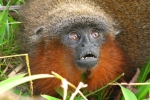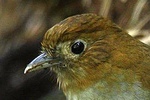
Friday, November 26, 2010
Image of newly discovered passion flower

Newly discovered species in Bolivia
Eight new plants discovered in Bolivia
Jeremy Hance
mongabay.com
November 07, 2010
"Before we started this project in 2000, this botanically rich area was essentially a white area on the map, almost unexplored," says Dr. Peter Jørgensen, associate curator at the Missouri Botanical Garden, in a press release. "There has been very little general collecting in this area. Over the course of a decade we have documented more than 7,000 species, which is about a third of what you can find in North America."
Of these 7,000 species, researchers with the project have found 132 that were unknown to science, only 32 of which have so far been formally described.
The protected areas spread over 100,000 square kilometers and cover habitats from high glacial peaks to the Amazon rainforest. Although protected, portions of these areas are threatened by new roads, expanding cattle ranching and farming.
Related articles
Life shocker: new species discovered every three days in the Amazon (10/26/2010) A new report by the World Wide Fund for Nature (WWF) confirms the Amazon rainforest, even as it is shrinking due to deforestation, remains among the world's most surprising places. According to the report,Amazon Alive, over the past decade (1999-2009) researchers have found 1,200 new species in the Amazon: one new species for every three days. Not surprisingly invertebrates, including insects, made up the bulk of new discoveries. But no type of species was left out: from 1999-2009 researchers discovered 637 new plants, 357 fish, 216 amphibians, 55 reptiles, 39 mammals, and 16 new birds. In new discoveries over the past decade, the Amazon has beaten out a number of high-biodiversity contenders including Borneo, the Eastern Himalayas, and the Congo rainforest.
(10/26/2010) A new report by the World Wide Fund for Nature (WWF) confirms the Amazon rainforest, even as it is shrinking due to deforestation, remains among the world's most surprising places. According to the report,Amazon Alive, over the past decade (1999-2009) researchers have found 1,200 new species in the Amazon: one new species for every three days. Not surprisingly invertebrates, including insects, made up the bulk of new discoveries. But no type of species was left out: from 1999-2009 researchers discovered 637 new plants, 357 fish, 216 amphibians, 55 reptiles, 39 mammals, and 16 new birds. In new discoveries over the past decade, the Amazon has beaten out a number of high-biodiversity contenders including Borneo, the Eastern Himalayas, and the Congo rainforest.
Stunning monkey discovered in the Colombian Amazon (08/11/2010) While the Amazon is being whittled away on all sides by logging, agriculture, roads, cattle ranching, mining, oil and gas exploration, today's announcement of a new monkey species proves that the world's greatest tropical rainforest still has many surprises to reveal. Scientists with the National University of Colombia and support from Conservation International (CI) have announced the discovery of a new monkey in the journal Primate Conservation on the Colombian border with Peru and Ecuador. The new species is a titi monkey, dubbed the Caquetá titi ( Callicebus caquetensis). However, the announcement comes with deep concern as researchers say it is likely the new species is already Critically Endangered due to a small population living in an area undergoing rapid deforestation for agriculture.
(08/11/2010) While the Amazon is being whittled away on all sides by logging, agriculture, roads, cattle ranching, mining, oil and gas exploration, today's announcement of a new monkey species proves that the world's greatest tropical rainforest still has many surprises to reveal. Scientists with the National University of Colombia and support from Conservation International (CI) have announced the discovery of a new monkey in the journal Primate Conservation on the Colombian border with Peru and Ecuador. The new species is a titi monkey, dubbed the Caquetá titi ( Callicebus caquetensis). However, the announcement comes with deep concern as researchers say it is likely the new species is already Critically Endangered due to a small population living in an area undergoing rapid deforestation for agriculture.
New bird discovered in Colombia—and released alive (05/26/2010) Researchers have discovered a new species of antpitta in the montane cloud forests of the Colibri del Sol Bird Reserve in western Colombia. A thrush-like bird, the new cinnamon and gray species was, according to a press release by the American Bird Conservancy (ABC), "captured, banded, measured, photographed, sampled for DNA, and then released alive back into the wild". This is one of only a few incidences in which a new species has been described without 'collecting' an individual (i.e. killing) to provide a model of the species in a museum. The new bird has been named Fenwick's antpitta (Grallaria fenwickorum) after the President of ABC, George Fenwick, and his family.
(05/26/2010) Researchers have discovered a new species of antpitta in the montane cloud forests of the Colibri del Sol Bird Reserve in western Colombia. A thrush-like bird, the new cinnamon and gray species was, according to a press release by the American Bird Conservancy (ABC), "captured, banded, measured, photographed, sampled for DNA, and then released alive back into the wild". This is one of only a few incidences in which a new species has been described without 'collecting' an individual (i.e. killing) to provide a model of the species in a museum. The new bird has been named Fenwick's antpitta (Grallaria fenwickorum) after the President of ABC, George Fenwick, and his family.
Friday, November 19, 2010
Quechua Week at New York University
Quechua at NYU Updates |
Quechua Night  Many thanks to Cassandra Torrico, who presented at the recent Quechua Conversation night in Bolivian Quechua. We had a great turnout, and the new format for the event is working out well. For those studying or interested in the language - this is a great place to continue developing your Quechua communication skills. Many thanks to Cassandra Torrico, who presented at the recent Quechua Conversation night in Bolivian Quechua. We had a great turnout, and the new format for the event is working out well. For those studying or interested in the language - this is a great place to continue developing your Quechua communication skills.Quechua Night is a monthly event held in Quechua that includes a presentation and lots of conversation time -- even those speakers at the basic level will leave having practiced Quechua. Read more about Quechua Night. Instead of having a Quechua Conversation Night in December, we will be focusing our energies onQuechua Week, see below. |
Quechua Week 2010  NYU's first ever Quechua Week will span the days between Monday December 13and Friday December 17. NYU's first ever Quechua Week will span the days between Monday December 13and Friday December 17. While some details are still pending regarding a film screening event, the rest of the week's events are posted on our Quechua Week page. Please forward this info to friends and colleagues who may be interested! If you are a student at NYU and would like to help with these events, please reply to this email with your availability. |